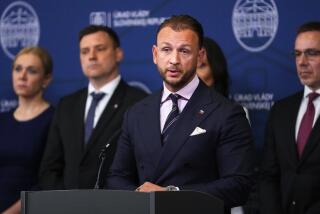NEWS ANALYSIS : CRISIS IN THE BALKANS : Serbia’s Milosevic Walks Fine Line as Crisis Deepens
- Share via
BELGRADE, Yugoslavia — As the war in Bosnia-Herzegovina begins to spiral out of control, the man whom most in the international community blame for starting it all has been silent.
Instead, Slobodan Milosevic, the president of Serbia who inspired and then publicly abandoned Serbian separatists in Bosnia and Croatia, has sent out signals showing he very much wants to toe the globally approved line.
That may be encouraging news to Western leaders who increasingly are looking to Milosevic to help defuse the crisis gripping the Balkans.
Yet the control Milosevic has over his onetime disciples is questionable.
Milosevic rarely speaks in public. His thoughts can generally be gleaned only from the newspapers and broadcast outlets he controls, and those media have largely downplayed last week’s NATO air strikes and the Bosnian Serbs’ retaliatory hostage-taking--or in some cases criticized them.
Milosevic’s proxies have emerged to scold the Bosnian Serbs for pushing the Balkans to the brink of total war.
“War is not necessary,” Yugoslav Foreign Minister Vladislav Jovanovic told the federal Parliament here Monday. “The whole world, which is very much against us, will become even more so” if the Serbs insist on rejecting a peaceful settlement.
Jovanovic, considered a mouthpiece for Milosevic, said the “forced unification” of Serbian states in Bosnia and Croatia with Serbian-led Yugoslavia “is a recipe for national catastrophe.”
This is all part of the new posture Milosevic adopted last year in an effort to remake his image into that of a moderate statesman and to speed the economic recovery of his government, hard hit by punishing U.N.-imposed sanctions.
When the old Yugoslav federation started to disintegrate in 1991, it was Milosevic’s dream of a Greater Serbia that motivated individuals such as Radovan Karadzic and other radical Serb nationalists in Bosnia and Croatia and rallied them to engage in brutal warfare to unite their disperse communities.
Milosevic then distanced himself from his proteges, not necessarily because he had sacrificed the dream but because he sees international recognition as the best way to hold on to power, diplomats and analysts here say.
And international recognition would come only with the ending of Serbia’s support for the war--at least a formal ending; the Bosnian Serbs continue to receive supplies and other support from people in Serbia through a porous, U.N.-monitored border.
Pursuing his quest for international recognition, Milosevic then sought the removal of economic sanctions imposed against Serbia as punishment for its role in the Bosnian conflict. In widely publicized dealings with U.S. and Russian envoys, Milosevic has indicated that he hopes to strike a deal whereby he will recognize Bosnia in exchange for removal of the sanctions. Diplomats told The Times last week that the deal was close to complete, and talks are resuming this week.
Milosevic is said to believe that the end of sanctions will mean the beginning of the foreign investment and business prosperity that he and his Socialist Party allies are eager to reap.
But events of the last few days complicate the matter for Milosevic.
On the one hand, he could stand to benefit as Karadzic digs himself deeper into a hole from which he cannot escape. It will become increasingly clear to many people in Belgrade who still had sympathy for the Bosnian Serbs that it is impossible to deal with Karadzic, analysts here say.
And that will make it easier for Milosevic to write off Karadzic completely, if that is what the Serbian president really wants to do.
Still, it is a fine line Milosevic must walk. He must criticize the Bosnian Serbs to please his international audience, but the criticism must not be too harsh lest he alienate a domestic audience that--Karadzic aside--feels allegiance to the cause of a Greater Serbia.
Consequently, the newspapers here have given muted coverage to a story that holds the rest of the world spellbound. The first air strikes by the North Atlantic Treaty Organization were relegated to the last minutes of Radio Belgrade’s principal afternoon broadcast.
Milosevic, who masterfully manipulated the Yugoslav propaganda machine to whip up nationalist fervor, is now using the same tools to calm and pacify the public.
“Now he uses the media as a sort of sleeping pill,” said political analyst Stojan Cerovic. The papers are saying “everything is all right, don’t worry. He wants to stop people from exploiting nationalism because he is no longer the one who wants to exploit it. Now it’s [his enemies] who could exploit nationalism.”
Indeed, the risks for Milosevic in recognizing Bosnia and abandoning the Bosnian Serbs come precisely from the still-active forces of ultranationalism in what is left of Yugoslavia.
Politicians such as Vojislav Seselj attack Milosevic for his new position toward the Bosnian Serbs, branding the president a “traitor.”
Seselj, who heads the opposition Serbian Radical Party, has launched a campaign of “civil disobedience” aimed at destabilizing Milosevic. Currently staging rallies around the country, he has called for a major demonstration in Belgrade on June 17.
And the Serbian Orthodox Church, staunch supporter of the Bosnian Serbs, last week blasted any plan to recognize Bosnia, saying Serbs would be reduced to second-class status if forced to live under Bosnian or Croatian rule.
Alluding to Milosevic, the Holy Synod of the church said: “The spiritual followers of ex-communism are ready again to pay a high price with the blood of our people, only to remain in power.”
More to Read
Sign up for Essential California
The most important California stories and recommendations in your inbox every morning.
You may occasionally receive promotional content from the Los Angeles Times.














